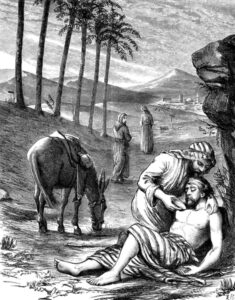In October 2024 I blogged about the influx of homeless individuals taking up residence in sites and encampments in the town where I live. I shared that I was approached on two different occasions by individuals who were in need of food. On each occasion I chose not to pass judgement on their situation or their appearance (such a response would only feed a self-righteous attitude), and instead, I let compassion and love rule the day. I gave them food and a little money because, for me, it was the right thing to do.
In that blog I also shared being challenged by a friend who suggested that the money I gave may have been put to ill use and that the individuals would most likely have their hands out for the next person to fill. And I had to concede that that was a strong possibility; but I stood firm—as I do know—that, for me, it was the right thing to do.
 A familiar parable in the Gospel of Luke (10:25-37) comes to mind. It tells of a man, understood to be Jewish, who was attacked by robbers, stripped of everything he had, including his clothing, and left for dead. A Jewish priest and a Levite passed by without helping him, but a Samaritan (a man hated by the Jews) stopped to assist, bandaged his wounds and took him to an inn for care. He gave no thought to the man’s position in life or his religion. He simply saw a person in great need.
A familiar parable in the Gospel of Luke (10:25-37) comes to mind. It tells of a man, understood to be Jewish, who was attacked by robbers, stripped of everything he had, including his clothing, and left for dead. A Jewish priest and a Levite passed by without helping him, but a Samaritan (a man hated by the Jews) stopped to assist, bandaged his wounds and took him to an inn for care. He gave no thought to the man’s position in life or his religion. He simply saw a person in great need.
This is a beautiful illustration of the importance of extending compassion to others regardless of ethnicity or religion—as in the case of the Samaritan—and regardless of one’s appearance and lifestyle—as in our world today. The parable serves as a foundation for understanding Christian morals and the call to “love your neighbor as yourself” (Matthew 22:39). It also serves as a powerful reminder of the impact any one of us can have on another person’s life. As we continue to witness the ongoing—and dare I say, growing—challenges of poverty and homelessness, the lessons from this timeless parable should inspire us to nurture a response of empathy through acts of kindness and compassion. Dare I suggest again that embracing the values portrayed in this ageless story could create meaningful and lasting change in our towns, in our neighbourhoods, and even in our families with each act of kindness, no matter how small, having the potential for a rippling effect!
should inspire us to nurture a response of empathy through acts of kindness and compassion. Dare I suggest again that embracing the values portrayed in this ageless story could create meaningful and lasting change in our towns, in our neighbourhoods, and even in our families with each act of kindness, no matter how small, having the potential for a rippling effect!
 Leo Tolstoy, the great Russian writer told of the time when he was walking down the street and passed a beggar. Tolstoy reached into his pocket to give the beggar some money, but his pocket was empty. Tolstoy turned to the man and said, “I’m sorry, my brother, but I have nothing to give.” The beggar brightened and said, “You have given me more than I asked for—you have called me brother.” Though Tolstoy lacked the means of restoring the man’s finances, he had the heart to restore his dignity.
Leo Tolstoy, the great Russian writer told of the time when he was walking down the street and passed a beggar. Tolstoy reached into his pocket to give the beggar some money, but his pocket was empty. Tolstoy turned to the man and said, “I’m sorry, my brother, but I have nothing to give.” The beggar brightened and said, “You have given me more than I asked for—you have called me brother.” Though Tolstoy lacked the means of restoring the man’s finances, he had the heart to restore his dignity.
To the one who is loved, a word of affection is a morsel,
but to the love-starved person, a word of affection can be a feast.
Max Lucado – He Still Moves Stones
2 Comments
Join the conversation and post a comment.



Beautiful reminder ! Thank you my friend.
You are more than welcome…my friend!!! You’re such an encourager!!